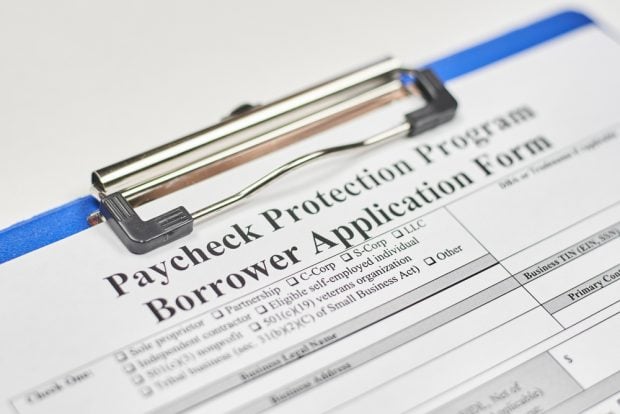 Source: Shutterstock.
Source: Shutterstock.
Amid all of the excruciating frustrations during the application process of the Paycheck Protection Program reported by many financial institutions, particularly small credit unions, some of them came through for "Main Street" businesses. Those businesses, considered the staples of local economies, sorely needed the federal government forgivable loans to survive the devastation wrought by the coronavirus economic shutdown.
Obviously, larger credit unions with more resources and personnel appeared to fare better, with some managing to secure hundreds or thousands of PPP loans for their community's small companies. Some of those financial cooperatives reported getting PPP loans for small businesses that were turned away by their large primary financial institution.
 Sarah Perez Jarett
Sarah Perez Jarett Recommended For You
Soon after PPP was announced, Mira Ness, president/CEO of the $26 million New York University Federal Credit Union near Washington Square Park, got an anxious call from one of its business members, Sarah Perez Jarrett. She is the CEO of Salud, a family-owned firm that has made and marketed a variety health supplement products for 25 years.
"She was very stressed out about the situation and was trying to decide if she should lay off people," Ness recalled.
It was a very scary time, Jarrett acknowledged, because it would have been very difficult to get orders, typically taken over the phone, out to customers without a full staff, many of whom are women who depend on their job to support their families.
 Mira Ness
Mira Ness Working long, hard hours, Ness and her staff managed to secure a $77,000 PPP loan for Salud, which came as a great relief to Jarrett.
"The fact that we are able to provide for [our employees] is what keeps us going," Jarrett said. "Everyone at NYUFCU was absolutely amazing. They were very understanding; it was not a robotic process by any means. They were very helpful in letting us know clearly what documents would be needed and making the process as painless as it could have been. They had a very humane approach, which was refreshing."
Although Salud has 17 employees, most of NYUFCU's business members are sole proprietors or employ just a couple or very few workers, Ness noted. Eighty-six percent of the credit union's 7,000 members are African American or Hispanic.
"My staff and I are really appreciative that we helped these small businesses that are really, really small businesses," Ness said.
NYUFCU secured 18 PPP loans that amounted to about $800,000, making the average loan size approximately $44,000.
About a mile away from NYUFCU, the $59 million Lower East Side Peoples Federal Credit Union reported that it secured 32 PPP loan approvals worth a total of $1.34 million for its business members, with the average loan amount at nearly $42,000.
"We had loans from $6,000 and $7,000 all the way up to $300,000," LESPFCU President/CEO Maureen Genna said. "We didn't have any problems with the actual approvals once we got all the data in. I've got a very smart business lender. She's been doing it for a long time. She followed the directions to the letter. Our issue was more with the functions on their [SBA's] system."
However, it appears many small business companies were not so lucky to secure PPP funding, according to a Lending Tree survey of small business owners.
Even when small firms applied quickly, many have not seen a penny. About six in 10 survey respondents completed their PPP applications within the first five days (April 3-7) during the first round of the SBA application process. Even so, only 5% of those small business owners received funding, according to the survey.
Additionally, 57% of small business owners had problems applying for PPP funds, with many citing inconsistent communication from their financial institutions and a lack of clarity about what documents were required by the SBA.
Credit unions also reported there were many technical glitches that prevented them from submitting completed applications; they also complained that the SBA kept making changes to its guidance during the application process that created a lot of confusion and delays.
Recently released reports detailed other issues with PPP that may have shorted some small businesses in underserved and rural markets, which included companies owned by women, minorities, veterans and other members of the military community.
The Office of the Inspector General for the SBA concluded that the SBA did not issue any guidance to lenders to prioritize the nation's underserved and rural markets, as specified in the CARES Act.
"Because SBA did not provide guidance to lenders about prioritizing borrowers in underserved and rural markets, these borrowers, including rural, minority and women-owned businesses may not have received loans as intended," the OIG report said. "In addition, because SBA did not require demographic data to identify PPP borrowers in underserved markets, it is unlikely that SBA will be able to determine the loan volume to the intended prioritized markets."
Nonetheless, some credit unions that serve rural regions did manage to secure PPP loans for their business members.
"We have helped 237 businesses and non-profits in rural central Minnesota," Chuck Albrecht, president/CEO of the $425 million Mid Minnesota Federal Credit Union in Baxter, said. "This includes a sanitation company that was about to lay off 50% of its workforce due to lack of seasonal cabin traffic, eight nonprofits and multiple businesses that were turned away from their large primary financial institution not taking additional applications."
 Chuck Albrecht
Chuck Albrecht The OIG has recommended that the SBA issue guidance to lenders requiring them to prioritize borrowers in underserved markets and revise the PPP borrower application to include optional demographic information for principals for the remaining available lending authority and any future lending under the program.
Another report by the Federal Reserve Bank of New York found that the states hit the hardest by the COVID-19 pandemic received fewer loans on a per-business basis in the first round of the PPP than states that suffered the least from the virus.
According to the New York Fed, which examined the $349 billion dispersed in the first round, less than 20% of the loan applications from small businesses in New York, the epicenter of the pandemic in the U.S., were approved compared with 55% for small businesses in Nebraska.
In addition to New York, some of the other hardest hit states, including New Jersey, Michigan and Pennsylvania, also got fewer loans than some Mountain and Midwest states on a per-small business basis, according to the report.
Fed researchers suggested that small companies in the Mountain and Midwest states may have received a larger share of PPP loans because those areas have a higher number of community financial institutions, which have a relationship with small business owners.
The report also found that small businesses in some of the industries that suffered the biggest losses from the COVID-19 pandemic, such as hotels and retail and food services businesses, received a smaller share of funds from PPP loans while companies in the construction and scientific and technical services industries received a larger share.
Some of the large asset-sized credit unions had the advantages of leveraging more resources in technology and personnel that allowed them to secure hundreds or thousands of PPP loans for small firms.
For example, Greater Commercial Lending, a wholly-owned subsidiary of the $1 billion Greater Nevada Credit Union in Carson City, submitted 5,360 applications from small businesses, totaling $566.4 million in funding. Some 1,045 of those loans for $101.4 million have been for Nevada-based businesses; 739 of them for $89.3 million were for entities in California. All told, GCL has assisted companies and sole proprietors in 49 states, three U.S. territories and Washington, D.C.
GCL said it increased staffing and launched technological enhancements to simplify and streamline the PPP application process. The company also expanded its relationships with third-party partners to ensure PPP loans are funded in a timely manner.
Utah's second largest credit union, the $9.8 billion Mountain America Credit Union in Sandy, processed 6,101 PPP loans for $325 million and was still accepting applications as of May 12.
"Being able to work rapidly to fund PPP loans has helped thousands of our business members to keep their employees on the payroll," according to MACU, which is a leading small business lender. "Our SBA team continues to work steadfastly to assist a wide variety of businesses keep their workforce employed, from auto repair, health care, schools, daycares, cleaning services and construction."
© 2025 ALM Global, LLC, All Rights Reserved. Request academic re-use from www.copyright.com. All other uses, submit a request to [email protected]. For more information visit Asset & Logo Licensing.








